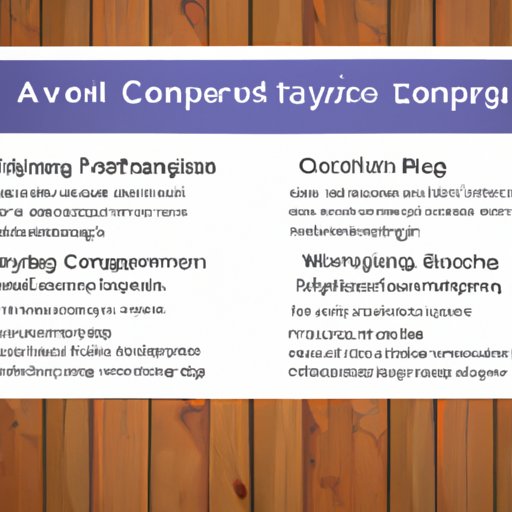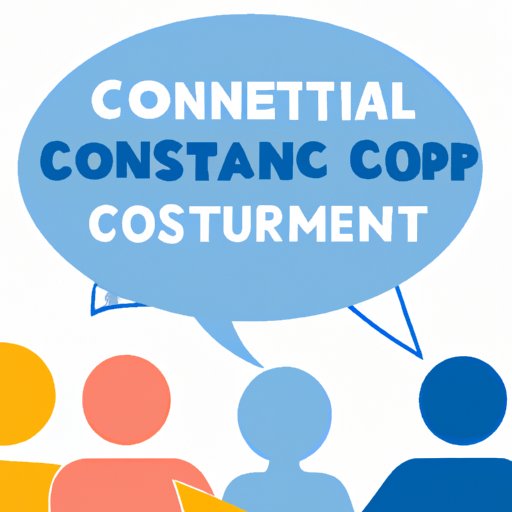Introduction
Counseling is a form of mental health care that involves speaking with a trained professional about personal issues or concerns. It can be used to treat a variety of mental health issues, such as depression, anxiety, post-traumatic stress disorder (PTSD), and more. Counseling can also help people develop coping skills, improve relationships, and manage stress.
The purpose of this article is to provide an overview of counseling costs, including average cost of different types of counseling, understanding insurance coverage for counseling, and exploring low-cost options for counseling.

An Overview of Counseling Costs
The cost of counseling varies depending on the type of counseling, the therapist’s experience, and geographic location. Generally, counseling sessions range from $75-$250 per hour, though some therapists may charge more or less.
In addition to the hourly rate, many therapists also charge a fee for missed appointments and late cancellations. This fee can vary from $15-$50 depending on the therapist.

A Breakdown of Average Cost for Different Types of Counseling
Individual counseling is the most common type of therapy and typically ranges from $75-$150 per hour. Group therapy is usually less expensive than individual sessions, and the cost typically ranges from $30-$60 per session. Family counseling is typically more expensive than individual counseling, and the cost can range from $100-$200 per hour. Online counseling is also becoming increasingly popular, and the cost is typically similar to in-person counseling, ranging from $75-$150 per hour.

Understanding Insurance Coverage for Counseling
Many health insurance plans cover counseling services, though the amount of coverage and type of services covered will vary by plan. It’s important to check with your insurance provider to understand what services are covered and how much you will be responsible for paying out of pocket.
If your insurance does cover counseling services, it’s important to note that many plans require pre-authorization before treatment begins. This means that you will need to get approval from your insurance company before you can begin counseling.
Exploring Low-Cost Options for Counseling
If you don’t have insurance or if your insurance doesn’t cover counseling services, there are still options available for getting affordable counseling. Community mental health centers are often a great resource for low-cost counseling. These centers offer sliding scale fees, meaning that they charge based on your income level.
University counseling centers are another great option for affordable counseling. These centers typically offer counseling services at a reduced rate, often around $20-$40 per session. Employee assistance programs (EAPs) are another option for those who work for larger organizations. EAPs are typically offered as part of an employer’s benefits package and offer free or low-cost counseling services.
How to Maximize the Benefits of Counseling Despite Cost
It’s important to remember that the cost of counseling should not be a barrier to seeking help. Even if you are unable to afford traditional counseling services, there are still ways to maximize the benefits of counseling.
First, it’s important to set realistic goals for yourself and your therapy. Goals should be specific, measurable, achievable, relevant, and timely. This will help you stay focused on what you want to get out of counseling and ensure that you are making progress.
Second, it’s important to utilize available resources. Research local mental health centers, university counseling centers, and employee assistance programs to find low-cost counseling options. There are also many free online resources available, such as hotlines and self-help websites.
Finally, it’s important to be open and honest with your therapist about your financial situation. This will allow them to better understand your needs and help you find the best way to access the help you need.
Conclusion
The cost of counseling can be intimidating, but there are many options available to help make counseling more affordable. Understand the average cost of different types of counseling, explore insurance coverage, and research low-cost options like community mental health centers, sliding scale fees, university counseling centers, and employee assistance programs. Set realistic goals, utilize available resources, and be open and honest with your therapist to maximize the benefits of counseling despite cost.
(Note: Is this article not meeting your expectations? Do you have knowledge or insights to share? Unlock new opportunities and expand your reach by joining our authors team. Click Registration to join us and share your expertise with our readers.)
